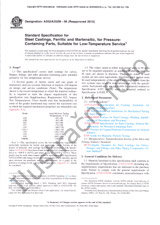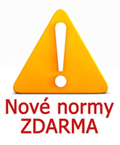Potřebujeme váš souhlas k využití jednotlivých dat, aby se vám mimo jiné mohly ukazovat informace týkající se vašich zájmů. Souhlas udělíte kliknutím na tlačítko „OK“.
ASTM D5013-18
Standard Practices for Sampling Wastes from Pipes and Other Point Discharges
Přeložit název
NORMA vydána dne 1.9.2018
Informace o normě:
Označení normy: ASTM D5013-18
Poznámka: NEPLATNÁ
Datum vydání normy: 1.9.2018
Kód zboží: NS-899559
Počet stran: 4
Přibližná hmotnost: 12 g (0.03 liber)
Země: Americká technická norma
Kategorie: Technické normy ASTM
Kategorie - podobné normy:
Anotace textu normy ASTM D5013-18 :
Keywords:
ICS Number Code 13.030.01 (Wastes in general)
Doplňující informace
| Significance and Use | ||||||||||
|
4.1 The procedure outlined in these practices are guides for obtaining descriptive samples of solid, semisolid, and liquid waste from flowing streams, and incorporate many of the same procedures and equipment covered in the Referenced Documents. These practices by themselves will not necessarily result in the collection of samples representative of the total waste mass. The degree to which samples describe a waste mass must be estimated by application of appropriate statistical methods and measures of quality assurance. It is recommended that those practices be used in conjunction with Guide D4687. |
||||||||||
| 1. Scope | ||||||||||
|
1.1 These practices provide guidance for obtaining samples of waste at discharge points from pipes, sluiceways, conduits, and conveyor belts. The following are included:
1.2 These practices are intended for situations in which there are no other applicable ASTM sampling methods (see Practices D140/D140M and D75/D75M) for the specific industry. 1.3 These practices do not address flow and time-proportional samplers and other automatic sampling devices. 1.4 Samples are taken from a flowing waste stream or moving waste mass and, therefore, are descriptive only within a certain period. The length of the period for which a sample is descriptive will depend on the sampling frequency and compositing scheme. 1.5 It is recommended that these practices be used in conjunction with Guide D4687. 1.6 This standard does not purport to address all of the safety concerns, if any, associated with its use. It is the responsibility of the user of this standard to establish appropriate safety, health, and environmental practices and determine the applicability of regulatory limitations prior to use. 1.7 This international standard was developed in accordance with internationally recognized principles on standardization established in the Decision on Principles for the Development of International Standards, Guides and Recommendations issued by the World Trade Organization Technical Barriers to Trade (TBT) Committee. |
||||||||||
| 2. Referenced Documents | ||||||||||
|
Odebírejte informace o nově vydaných normách ZDARMA:
Chcete pravidelně odebírat informace o nově vycházejících normách z celého světa a to zcela zdarma?
Přihlašte se k odběru. Vše je velice jednoduché a absolutně ZDARMA.
Na výběr máte vydavatele z celého světa.




 Cookies
Cookies
